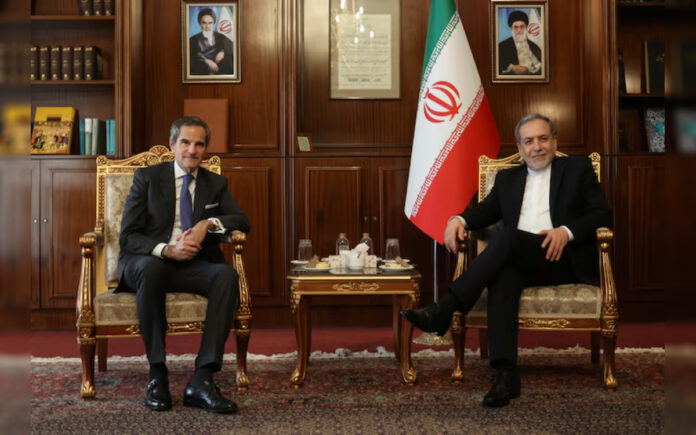Tehran: Iran has expressed a willingness to break the deadlock with the United Nations’ nuclear agency over its nuclear program but insists it will not yield to pressure tactics, Iranian Foreign Minister Abbas Araqchi stated after meeting with IAEA Director General Rafael Grossi in Tehran on Thursday.
According to diplomats, European powers (known as E3) are reportedly pushing for a new resolution by the International Atomic Energy Agency (IAEA) board to exert pressure on Iran due to its perceived lack of cooperation. The push from Europe comes as former U.S. President Donald Trump prepares to assume office again in January, raising questions about whether he will revive his previous “maximum pressure” approach toward Iran.
Following his meeting with Grossi, Araqchi posted on X: “The ball is in the EU/E3 court. [Iran is] willing to negotiate based on our national interest and inalienable rights, but not ready to negotiate under pressure and intimidation.” He also expressed hope that European powers would adopt what he termed a “rational policy.”
Important & straightforward talks with DG @rafaelmgrossi this morning.
— Seyed Abbas Araghchi (@araghchi) November 14, 2024
As a committed member of NPT we continue our full cooperation with the IAEA. Differences can be resolved through cooperation and dialogue. We agreed to proceed with courage and good will.
Iran has never… pic.twitter.com/bwLLzrKzwE
Tensions between Iran and the IAEA have escalated due to unresolved issues, including restrictions on IAEA inspectors and unexplained traces of uranium at undeclared sites. In a report from August, the IAEA indicated that Iran has continued enriching uranium at high levels and has not improved cooperation, despite a resolution passed by the IAEA Board of Governors in June.
Grossi, aiming to make progress with Tehran on its nuclear developments, stated that “Inspections are just one chapter of our cooperation and cannot be discussed.” His comments highlight ongoing friction between Iran and the international community over inspections and transparency regarding its nuclear activities.
Iran’s uranium enrichment activities have become a focal point for international concern since the U.S. exit from the 2015 nuclear agreement in 2018, which was designed to limit Tehran’s nuclear capacity in exchange for sanctions relief. Iran has since enriched uranium to 60% purity—close to the 90% threshold needed for nuclear weapons, though it maintains its activities are purely peaceful.
In a meeting with Grossi, Iran’s nuclear chief Mohammad Eslami described their exchange as “constructive.” However, he cautioned that Iran would respond immediately to any resolution passed against it at the IAEA board meeting next week, without providing specific details.
Also Read | Ukraine Denies Nuclear Weapons Ambitions Amid Recent Claims
A senior Iranian official hinted at a potential reduction in diplomatic and technical cooperation with the IAEA if a new resolution is passed. Grossi, speaking at a televised press conference alongside Eslami, urged Iran to make strides toward addressing the IAEA’s outstanding concerns. “It is in our power here to take concrete steps that will indicate clearly, to the U.S. and the international community, that we can clarify things and move forward with concrete solutions,” he stated.
Also Read | India’s Wholesale Inflation Surges to Four-Month High in October
Grossi, who arrived in Tehran on Wednesday, is expected to meet with Iranian President Masoud Pezeshkian for the first time since he took office in August. President Pezeshkian, who is regarded as relatively moderate, recently commented that Iran must “handle its enemies with forbearance,” acknowledging that Tehran cannot completely overlook its adversarial relationship with the U.S.



